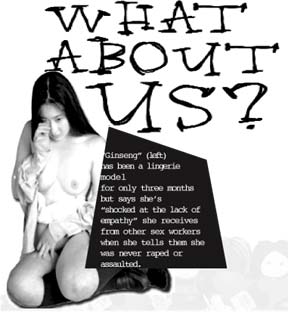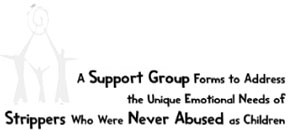|
"Can we, as a country, all
agree
|
|
xmag.com
: May
2002:What About us?
|
|

The
women come and the women go, filling this small, damp,
vaguely oniony-smelling room with stories of their
pain. They cry so many tears that their faces melt
into a giant, peach-colored, blubbering Everywoman.
Their pain is so real, it's painful to listen. These
women are here to share their pain with one another...to
honor each other's pain...to envy each other's pain...to
nurture each other's pain...to multiply that pain
until all they feel is pain...and then to talk about
that pain over donuts 'n' coffee at a fat male social
worker's basement in Southeast Portland every Thursday
at 3PM. 
THESE
WOMEN, mostly young and attractive, are among an estimated
thirteen or fourteen members of a local sex workers'
support group called What About Us?,
a nonprofit organization whose literature states:
Just
because you were never raped or molested doesn't mean
you can't feel pain. It doesn't mean you can't imagine
what it felt like. It doesn't mean you should be ostracized
by other sex workers who've suffered "real" abuse.
We are all women, and an essential part of our womanhood
is to suffer and then tell everyone about it later.
"NOW
I KNOW WHAT IT FEELS LIKE TO BE BLACK," says "Xena,"
a stripper who dances at Snapper's in Hood River and Bucky
Beaver's in
Oregon City. Xena's been attending What About Us? meetings
for nearly two months after suffering what she calls "a
miniature-sized nervous breakdown" when other dancers
at her club failed to invite her to an all-night slumber
party, pizza feed, and clothing swap. "They said they
'forgot' to invite me, but I know why they didn't," Xena
says now. "It's because I was never raped or abused. Because
I'm happily married and don't do drugs. Because I've never
thrown a rock through a boyfriend's window or cut off
all my hair when I'm upset. Because I'm the weirdo.
The outcast. But these What About Us? meetings
have given me a new outlook on life, and I've come to
embrace the idea that my suffering is every bit as precious
as theirs, even though their suffering may have been a
little more, y'know, dramatic. It's still my suffering
and it's still important to me."
"I
COULD ALMOST CRY when I hear some of the stories these
girls tell,"
Tom Roberts, the What About Us? group founder,
tells me later as we kayak down the Columbia River under
a gorgeous late-spring sunset.
An obese man who's perpetually running his tongue along
the outside of his teeth, Roberts says he started What
About Us? after working for two years as a bouncer
at a notorious juice bar called The Oyster's Pearl in
Molalla. "After a while, I'd see these girls come in,
these lost-looking girls, and I could tell just by the
way they
carried themselves that they had never been molested as
children, and that as adults they were tortured by their
abuse-free past and didn't want any of the other strippers
to know about it. That's when I decided to get involved
in helping the nonabused and the underabused."
"Is
that so?" I counter. "Several strippers have told me that
you run the support group because it's an easy way for
you to meet chicks and exploit their emotional vulnerability."
Roberts
says nothing. Instead, he makes a loud coughing sound,
continues paddling the kayak, and softly breaks wind.
"I
HAVE TWO WORDS for these whiny, unmolested, unassaulted
bitches: WHAT and EVER," says Fondue, a stripper who boasts
of having been sexually, physically, mentally, and spiritually
abused by both parents and all four grandparents and is
widely known as The Woman Who Brought Naked Spaghetti
Wrestling to Portland. "That's right: Whatever.
Yadda yadda yadda. See ya, wouldn't wanna be ya! I could
care less."
"I
think you meant to say that you couldn't care less,"
I politely suggest to Fondue in between sips of my Shirley
Temple as we sit at the Ship Ahoy bar in Southeast Portland.
"You
couldn't care less. If you 'could care less,' that
implies you must already care some."
"But
dude--I could care less."
"I
don't think you understand what I'm saying," I tell her.
"Whatever,
dude," comes her sharp-tongued retort.
THEY
ARE THE LOST SHEEP of the sex-worker flock, these unfortunate
dames and lassies who suffer discrimination and emotional
estrangement due to a lack of compelling, graphic, disturbing,
sympathy-engendering "abuse stories" from their past.
Our industry should pull together and quit making the
nonabused and underabused feel ashamed. While the lion's
share of industry workers can recount childhood events
that make the most jaded among us blush with horror and
envy, some girls weren't nearly so lucky. We all suffer
in various ways and degrees, but few forms of suffering
can match the suffering one suffers from never having
suffered enough.

|
|
|
| ©
2002 X Publishing, Inc. All rights reserved. copyright | trademark | legal notices |
|





